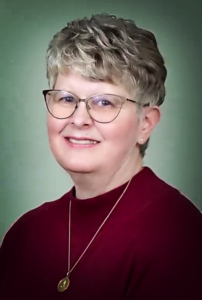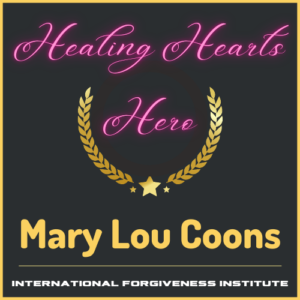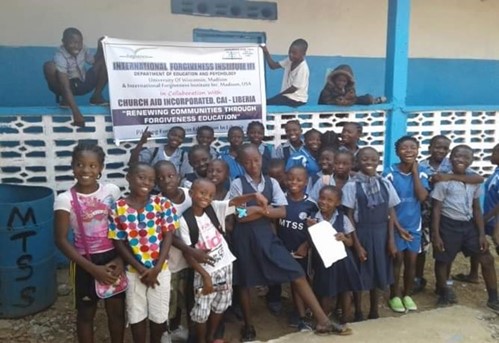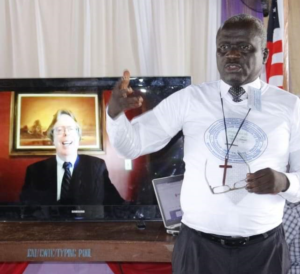Tagged: “adolescents”
Expert Forgiveness Advice from Media Giants
The 6th-largest newspaper in the US and the country’s most popular weekly supermarket magazine have highlighted the importance of forgiveness in the past few days. The Washington Post and Woman’s World recently ran articles offering advice on how to forgive from forgiveness experts including Dr. Robert Enright, co-founder of the International Forgiveness Institute.
“Moving lessons on forgiveness out of religious spaces and into schools”
This full-length article is featured in the Jan. 27 issue of The Washington Post (a 146-year-old daily newspaper with average weekday circulation of nearly half a million). The article highlights the benefits of forgiveness education work being done by Dr. Enright, one of his research associates Dr. Suzanne Freedman (University of Northern Iowa), and Dr. Frederic Luskin (director of the Stanford University Forgiveness Project).
highlights the benefits of forgiveness education work being done by Dr. Enright, one of his research associates Dr. Suzanne Freedman (University of Northern Iowa), and Dr. Frederic Luskin (director of the Stanford University Forgiveness Project).
“. . .people who forgive are less anxious and angry and have lower blood pressure, improved cholesterol levels and a better quality of sleep,” the article states, citing the published literature. “Studies also show that children who learn how to forgive are better adjusted socially and have higher levels of self-esteem than those who don’t. They even perform better academically.”
Much of the article focuses on Dr. Enright’s forgiveness education work in Northern Ireland, where both public and private schools have been teaching his forgiveness curriculum for the past 21 years. One school, Mount St. Michael’s Primary School, a Catholic school in Randalstown, 23 miles from Belfast, recently paired up with a Protestant school in the same town to offer forgiveness education to a joint class of 7-to-9-year-olds.
“We really need this over here,” St. Michael’s Principal Philip Lavery said. “We teach children how to read and write, but we have to spend more time teaching them how to live, how to be members of a society.”
At Stranmillis University College in Belfast, forgiveness education is a required subject for all students in its teacher training program, where they learn the protocol developed by Dr. Enright and his team at the University of Wisconsin. In a country that has been torn for decades by religious violence, the article concludes, it is only through forgiveness and unselfish love that “we can leave the past behind us.”
Read the full article in The Washington Post.
“Expert Advice: How Can I Stop Beating Myself Up?”
This article appears in the January 26 issue of Woman’s World magazine (circulation 1.6 million). Subtitled “Sometimes it’s harder to forgive yourself than to forgive others,” the article presents “easy ways to silence the self-blame and welcome self-love.”
The article is based on interviews with three mental health specialists the publication calls its Expert Panel:
- Robert Enright, Ph.D., educational psychologist and professor at the University of Wisconsin-Madison;
- Everett Worthington, Ph.D., Commonwealth Professor Emeritus at Virginia Commonwealth University; and,
- Kathryn J. Norlock, Ph.D., author of The Moral Psychology of Forgiveness and an ethics professor at Trent University in Ontario, Canada.
The first (and, arguably, the most important) bit of advice offered in the Woman’s World article is:
Remember You’re Worthy – The very first step to self-forgiveness is simply knowing you deserve it, says expert Robert Enright, PhD. “This doesn’t mean letting yourself off the hook without reflecting on what’s happened; rather, it’s reminding yourself that you’re worthy when you’ve started believing the lie that you’re not.” Just reminding yourself that you deserve this nurturing will begin to transform guilt into self-compassion.
Read the full article in Woman’s World.
I am a parent with a child who is angry. This started when my husband divorced me. I say my child is angry because of rather quick temper tantrums. Yet, when I talk with him about his anger, he is in denial, telling me that he has no anger. What advice do you have for me to begin helping him to see that, indeed, he is angry, actually quite angry?
First, I think you need patience with your child. He is deeply hurt because of the divorce. I say that because you say his temper tantrums began in the context of the divorce. Rather than discussing his anger, I recommend that you gently talk with him about his wounded heart. Give him time to see that he is deeply hurt by his father leaving. Once he can see this, then talking about forgiveness is a next step. Once your child has the safety-net of forgiveness (that can lessen hurt and anger), he then likely will be open to seeing that he is angry and that there is a solution to it–forgiveness.
Partnership Achievement Award Presented to Mary Lou Coons
Mary Lou Coons, founder of the Puppets For Peace Foundation, has been recognized with the “Healing Hearts Hero Award” by the International Forgiveness Institute (IFI). The award recognizes exceptional efforts by individuals who have partnered with the IFI and its co-founder, Dr. Robert Enright, to advance the broader understanding and application of the virtue of forgiveness.

Mary Lou Coons
An always-cheerful optimist, Mary Lou excels at using every tool available to her to overcome life’s adversities–like the brain and spinal cord maladies that have caused her to endure years of debilitating pain as well as repeated life-threatening (and life-saving) surgeries.
In fact, just days after her second Chiari Malformation brain surgery (technically known as posterior fossa decompression surgery) in 2012, Mary Lou made her first call to the IFI after learning that Dr. Enright was pioneering Forgiveness Education work with children. She was convinced that her passion for ventriloquism and puppets could somehow supplement those efforts so she volunteered her services.
In the ten years since then, Mary Lou has become a self-appointed “forgiveness ambassador” on a mission to teach as many others as she can about the benefits of forgiveness. Her efforts have included:
- Single-handedly convincing her parish elementary school (Holy Family School, Syracuse, NY) to adopt and teach Forgiveness Education in all of its classrooms from pre-kindergarten through 6th grade;
- Organizing and setting up a display booth to promote forgiveness to the more than 1,000 attendees at a Women’s Conference in Syracuse – resulting in more of the state’s schools considering the use of Forgiveness Education Curriculum Guides;
- Creating and producing three video recordings featuring her red-haired puppet Lily that are used by elementary school teachers to help illustrate Forgiveness Education principles to students;
- Introducing IFI staff to teacher-missionaries in Rwanda in order to add that country to the list of more than 30 around the world where Forgiveness Education is being taught;
- Producing a 10-minute online video version of Rising Above the Storm Clouds, Dr. Enright’s storybook for children, that is used in the 3rd and 4th grade programs.
 “Despite all that activity, Mary Lou never asked for a penny of payment or reimbursement,” Dr. Enright said in recognizing her with the Healing Hearts Hero Award. “Through the Puppets for Peace Foundation she set up 15 years ago, she continues to make important contributions that focus particularly on the lives of one of our most important assets—our children.”
“Despite all that activity, Mary Lou never asked for a penny of payment or reimbursement,” Dr. Enright said in recognizing her with the Healing Hearts Hero Award. “Through the Puppets for Peace Foundation she set up 15 years ago, she continues to make important contributions that focus particularly on the lives of one of our most important assets—our children.”
According to Mary Lou, the mission of her foundation is “to help spread peace, love and forgiveness. One of the best ways I’ve found to do that is by working with Forgiveness Education programs because it brings happiness to my heart as well as to the hearts of so many others.”
Visit the Puppets for Peace Foundation website.
Another question for my academic work: Was the Hebl and Enright (1993) study the very first empirically-based publication on forgiveness or is there an earlier publication that uses research to examine forgiveness?
Yes, there is a research article published in 1989. It is an empirically-based study that is not a forgiveness intervention. Instead it is an examination of how children, adolescents, and adults think about forgiveness. Data were collected and statistics applied to the responses. This is the reference to that work:
Enright, R. D., Santos, M., & Al-Mabuk, R. (1989). The adolescent as forgiver. Journal of Adolescence, 12, 95-110.
Liberia Seeks Peace Through Forgiveness

Forgiveness Education class at Mother Tegeste Stewart Apostolic Pentecostal School in Brewerville, Monrovia, Liberia.
Bishop Brown has been working with IFI co-founder Dr. Robert Enright to implement elementary and secondary school Forgiveness Education initiatives (including for all 500 students at the Mother Tegeste Stewart Apostolic Pentecostal School in Brewerville), after-school forgiveness education clubs, and Sunday School forgiveness lessons. Since 2017, Group Forgiveness interventions also have been incorporated into the LFEP thanks to Bishop Brown’s significant role in governmental affairs.
“I suggested that approach, in all humility, because dialogue will not be fruitful if those engaging in the dialogue are still very angry about past grievances,” Dr. Enright explained. “Forgiveness is a scientifically-supported way of eliminating that anger.”
- Can Group Forgiveness In Liberia Lead to Peace?
- A New Strategy for Peace in the World. . . The Enright Forgiveness Inventory
- First Ebola, Now Coronavirus: Liberia Suffers Again




